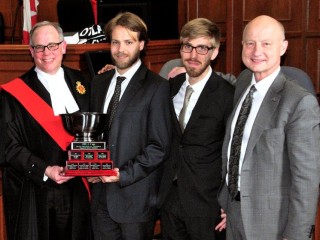Released March 22, 2016 | Full Decision [CanLII]
Andrew and Gavin Clarke (“the Clarkes”) were injured in a motor vehicle collision on April 7, 2006. They retained Joseph Faust to represent them on their claims for accident benefits and tort damages. Mr. Faust issued a statement of claim in respect of the collision on June 17, 2008, nine weeks after the second anniversary of the collision.
Prior to filing the statement of claim, the Clarkes retained new counsel. After obtaining the file from Mr. Faust, the new solicitor told the appellants that the statement of claim had not been issued within two years of the accident. However, he advised them this was not necessarily fatal to their claim because under the doctrine of discoverability, the claim might not have been commenced beyond the limitation period. He also, out of an abundance of caution, on July 2, 2008 wrote to Mr. Faust and advised him that he should put his liability insurer on notice. Mr. Faust took the position that no limitation period had been missed because of the doctrine of discoverability.
For a time, the Clarke’s new counsel believed that he had convinced defence counsel in the motor vehicle action that discoverability applied and that there was no breach of a limitation period. However, on March 18, 2009 defence counsel in the tort action amended their pleading to plead the missed limitation period. The Clarkes then commenced their professional negligence action against Mr. Faust on December 22, 2010. Mr. Faust pleaded the appellants’ professional negligence action against him was statute-barred because it was commenced more than two years after the Clarkes knew or ought to have known that they had a cause of action against him. Mr. Faust moved for summary judgment dismissing the Clarke’s claim against him.
Before the motions judge, the Clarkes argued that, until the defendants in the tort action pleaded a limitations defence, no damage had been caused to them as a result of his failure to have instituted the action within the two year period following the collision. However much a wrong may have been committed, they contended, no damages could be said to flow. By this logic, the right to the claim was not discovered until the Statement of Defence was amended on March 18, 2009.
The motions judge rejected the Clarke’s position. On her reading of the Limitations Act, 2002, S.O. 2002, c.24, Sch. B, a limitation period could begin to run before the person with the claim sustained any damages
Juriansz J.A, writing for a unanimous panel, held that the motion judge was mistaken in her understanding of the Limitations Act, 2002, She failed to consider the requirement of s. 5(1)(a)(iv) that a person with a claim know that a proceeding would be an appropriate means to seek to remedy the injury, loss or damage having regard to its nature. That provision requires a person to have good reason to believe he or she has a legal claim for damages before knowing that commencing a proceeding would be an appropriate means to seek to remedy the injury, loss or damage.
The Court of Appeal then attempted to determine when the Clarkes would have first known that commencing a proceeding would be an appropriate means of seeking a remedy for their claim against Mr. Faust considering the nature of the injury, loss or damage.
The Court held that the amendment of the statement of defence in the motor vehicle action on March 18, 2009 to plead the limitation period was the first time that the Clarkes ought to have known that a lawsuit against Mr. Faust was appropriate.
Juriansz J.A. was also satisfied that the objective test in s. 5 (1)(b) of the Limitations Act, 2002 was met. A reasonable person with the abilities and in the circumstances of the Clarkes would not have known it was appropriate to commence a legal proceeding before the amendment of the statement of defence in the motor vehicle action.
Appeal allowed, the motion judge’s judgment was set aside and replaced with an order dismissing the summary judgment motion. Costs of the motion and the appeal were awarded to the Clarkes in an amount to be fixed or agreed upon.
The Clarkes’ counsel: Edward Goldentuler.












